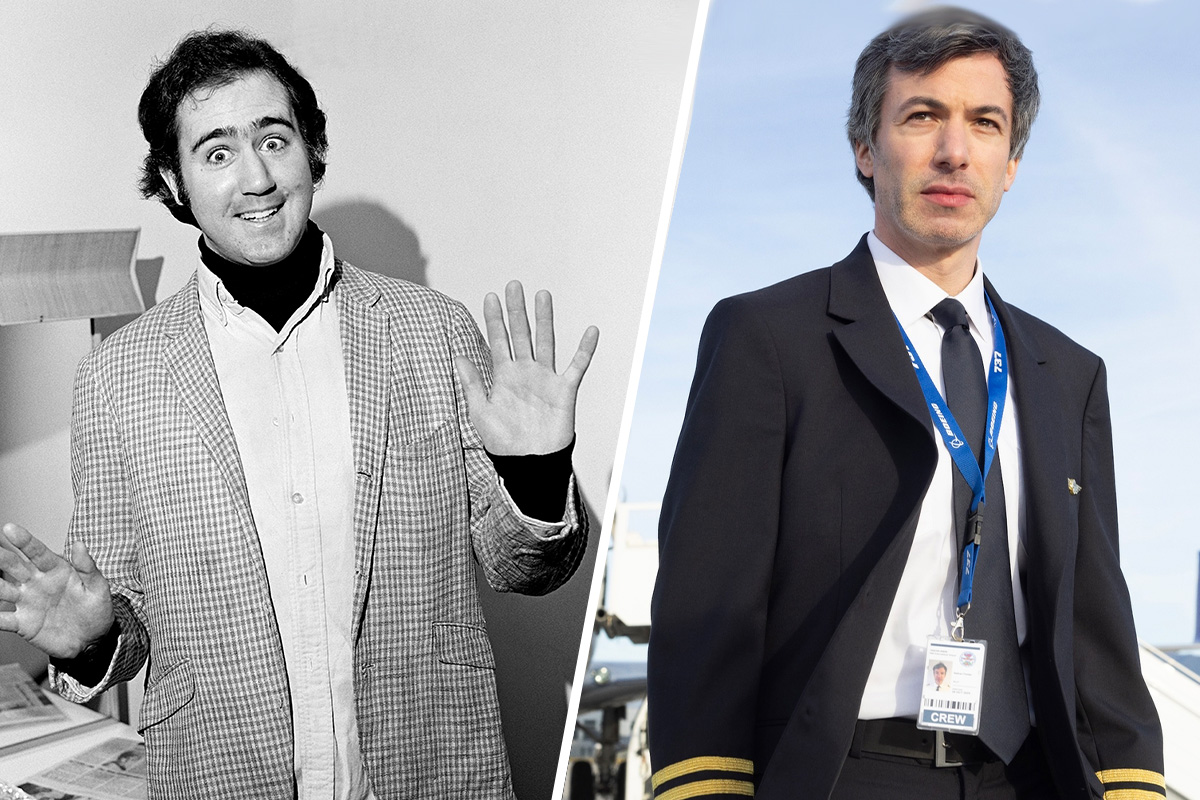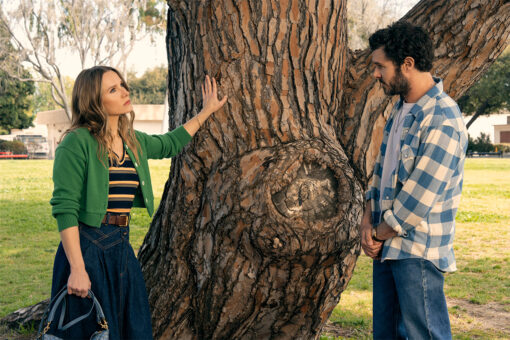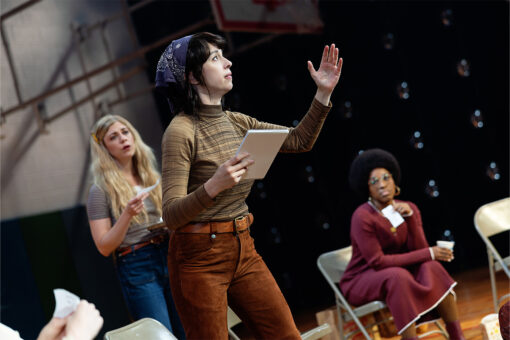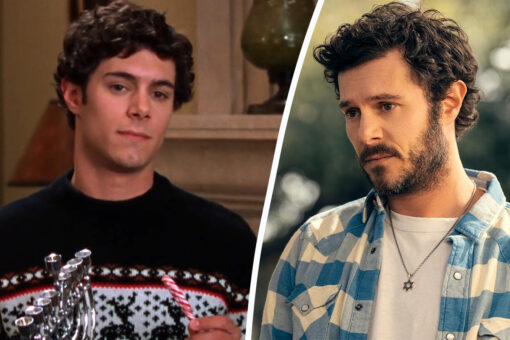Editorial note: Light spoilers ahead for “The Rehearsal” season two.
Multiple times as I watched season two of “The Rehearsal,” mouth agape, the same thought came to my mind: “There has never been anything like this on television in my lifetime.” I thought it when Canadian Jewish comedian Nathan Fielder implied that Paramount+ is run by Nazis. I thought it again when Nathan breastfed from a giant puppet. And I actually said it out loud when, in the finale, he successfully flew a 737 commercial aircraft full of actors.
Through “Nathan For You” and both seasons of “The Rehearsal,” Fielder has proved that he is a one-of-a-kind comedian and the most experimental and adventurous performer of this generation; and I stand behind my statement that what he’s been able to put on television is something I have never before seen in my near quarter-century as a TV viewer. But as I watched “The Rehearsal” finale this past weekend, I couldn’t help but realize that what I was seeing was coming from a place which had been on TV before. I saw the distinct lineage between Nathan and another legendary Jewish comedian in full force. I am, of course, talking about Andy Kaufman.
I will admit that this isn’t an original thought or comparison. In the first sentence of his review of “The Rehearsal,” New Yorker critic Gideon Lewis-Kraus relates Nathan Fielder to Andy Kaufman. Jason Zinoman of the New York Times says a sketch on the late-night comedy show “Fridays” featuring Andy Kaufman has “the feel of a prank by Nathan Fielder.” And in a review of “Thank You Very Much,” a documentary about Kaufman’s life, New York Times Magazine writer Jonah Weiner referred to Kaufman’s “comedic DNA.” “This DNA would go on to inform the work not only of individual heirs like Sacha Baron Cohen and Nathan Fielder (masters of weaving disruptive comic personae into real-world situations),” he writes, “but also of street-prank shows like ‘Jackass,’ and entire comedic subgenres, like early-aughts cringe comedy, which mined the humorous potential of unease.”
But as I was discussing with my editor Molly Tolsky the potential for writing this piece at all, she posed a question that I myself had been pondering. “Do people not know who Andy Kaufman is?” Of course, the New Yorker and New York Times audience is familiar with Andy Kaufman, as Molly and I are. But I’m not sure that’s true of the rest of my generation — beyond the few like me, whose parents gave them a robust education in 20th-century Jewish comedy. (In case you’re curious, yes, I did spend many of my childhood weekends watching the Marx Brothers, Mel Brooks, Jackie Mason and early episodes of “Saturday Night Live” instead of going to sleepovers, thank you very much.) So it’s completely non-judgmental when I observe that for all the love, recognition and memes I see 20-somethings devoting to Nathan Fielder online, I do not see that same energy for the original king of cringe and anti-comedy Andy Kaufman.
I think it’s time we change that.
@redesdenadie Andy Kaufman on the first #SNL #retrotv #andykaufman #mightymouse #performance #happening #comedy
Kaufman got his start in performance as a kid growing up in a middle-class Jewish family in Great Neck, Long Island. Starting around age 8, he sang, developed bits, performed intentionally bad magic tricks and played back recordings of the audience he had captured as an entertainer for other kids’ birthday parties. (I can only imagine what he got up to — or wanted to get up to — at his bar mitzvah, which took place at Temple Beth El in 1962.) The defiance and irreverence that would mark Andy’s comedy style also took root at an early age. “He was very difficult in that he would never accept things at face value, ” Stanley Kaufman, Andy’s father, later remembered. “I had some tremendous arguments with him. In trying to prove a point on a given subject where I wasn’t making any headway, I would end up saying, ‘Well, my God! Isn’t one and one two?’ And he’d look me in the eye and say, ‘Not necessarily.'”
If that’s not a Jewish point of view, I don’t know what is. Though, for what it’s worth, Kaufman later prankishly claimed he didn’t know he was Jewish until later in life. Apparently, he claimed his new-found Jewish identity by coming home from junior college for Passover one year and performing the prayers in a Jackie Mason-style accent.
After graduating from Grahm Junior College in 1972, Kaufman went on the comedy club circuit and began to hone the acts he would become known for. Part of this was his iconic “Foreign Man” character. I know that sounds like it’s punching down. But as with all of Kaufman’s sets, I think he was more so playing with the bounds of what will get any reaction from the audience rather than playing into harmful stereotypes. (Unlike Fielder, Kaufman publicly stated that his goal wasn’t really in the pursuit of comedy or laughs. “I’ve never told a joke in my life,” Kaufman once famously said.)
Inspired by his college roommate, an Iranian man named Bijan Kimiachi, Kaufman’s Foreign Man is deeply endearing and awkward with his palpable excitement to tell very bad jokes. Each terrible non-punchline is end-capped with the a sweet, “Thank you very much!” Though Kaufman performed his Foreign Man everywhere from “Van Dyke and Company” to “Hollywood Squares” to “The Dating Game,” he’s perhaps best known for doing it on “Saturday Night Live.” This includes the show’s very first episode where he nervously lip syncs to the theme from “Mighty Mouse.” You might’ve seen Nicholas Braun perform this in the movie “Saturday Night” or Jim Carrey in “Man on the Moon,” but nothing is quite as good as the original.
During his run of appearances on “Saturday Night Live” from 1975-1982, Kaufman further established his outrageous sensibility by goading women into wrestling with him as a misogynistic character called the Intergender World Wrestling Champion. He played the bongos and yodeled. He even allowing the audience to vote as to whether or not he would be banned from SNL. With a vote of 195,544 to 169,186, the audience voted to “Dump Andy,” and he only appeared on “Saturday Night Live” one more time after that in a pre-recorded segment to say goodbye.
Still, even before he was voted off SNL, Kaufman was able to transform his Foreign Man into the character of Latka Gravas for the hit sitcom “Taxi.” In reality, Kaufman hated the idea of doing a sitcom, but his manager talked him into it as a way to get famous enough to do his own projects. It worked, and Kaufman got his own TV special “Andy’s Funhouse,” which aired in 1979. In return, audiences got Latka, a sweet and goofy immigrant mechanic. (Latka’s country of origin is never specified, but given the fact that his name is Latka and his wife, played by Jewish actress Carol Kane, is named Simka, I always assumed they were Jewish.) Later in the series, Latka is revealed to have dissociative identity disorder — a product of Kaufman getting bored with the character and, you know, the ’70s. Through this, he got to flex his comedic muscle, playing Latkas’ alter identities in womanizer Vic Ferrari, a cowboy named Arlo and even a copy of his co-worker Alex.
If this all sounds relatively tame for Kaufman, his time on “Taxi” wasn’t without at least one stunt. After insisting that his character, foul-mouthed lounge singer Tony Clifton, have a guest role on the show, as if Clifton were a real person, Kaufman as Clifton had a tantrum on set. This resulted in Clifton getting fired and escorted off the set by security guards, which was reported on by local press. The press wrote about the incident as if Tony Clifton were a real person, which, apparently, Kaufman loved.
I mention Kaufman’s Foreign Man and Latka Gravas because they are perhaps what Kaufman is best known for. But one could fill an entire book (and some have) with all the weird, uncomfortable, prankish, hilarious and un-comedic spectacles from Kaufman’s short career. I could just as well harp on about the time he broke character during an SNL sketch and apologized to the audience for his portrayal of Elvis Presley; or when he got in a fake brawl with “Seinfeld” actor Michael Richards and comedian Jack Burns on the show “Fridays.” There was also the time when he did a show at Carnegie Hall and had his “grandmother” sit on a chair onstage, only to reveal at the end of the show that his grandmother was Robin Williams in a mask all along; or when, at the end of another show at Carnegie Hall, he took his entire audience out for milk and cookies. I could talk about when he got into a staged fight with pro-wrestler Jerry Lawler on “Late Night With David Letterman;” or when he panhandled on “Late Night” and eventually had to be removed from the studio by security.
There would likely be much more to point to, too, if it were not for Kaufman’s all-too-soon death in 1984 at the age of 35 from lung cancer. Given that Kaufman was who he was, some fans received the news of his death as an elaborate hoax masterminded by the comedian. Unfortunately for us, that has proven not the case. Kaufman was interred at Beth David cemetery in New York.
But in seeing all the elaborate stunts that Nathan Fielder has pulled off on his own shows, as well as his own bizarre antics like concocting a wild anecdote for “Jimmy Kimmel Live!” or his elaborate personality-shift, also on “Jimmy Kimmel,” comedy lovers can feel the l’dor v’dor, or the Jewish concept of generation to generation, between Fielder and Kaufman. Both expertly toy with the idea of comedic persona and reality, putting way too much of themselves onscreen while at the same time they feel unknowable as individuals outside their acts. But it’s not an exaggeration to say that without Kaufman, Nathan Fielder would not have the comedic building blocks to stand on. Without Foreign Man, we would likely not have Fielder’s Captain Sully Sullenberger.
In this way, it’s not a hoax to say that through Nathan Fielder, Andy Kaufman’s life and comedy are still alive. And that is absolutely a blessing.



